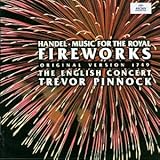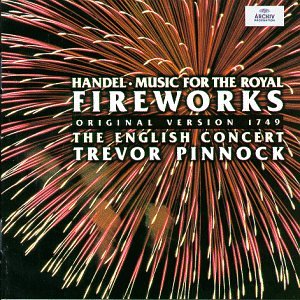Georg Friedrich Händel Album: «Handel: Music for the Royal Fireworks (Original Version 1749)»

- Customers rating: (4.9 of 5)
- Title:Handel: Music for the Royal Fireworks (Original Version 1749)
- Release date:1997-11-11
- Type:Audio CD
- Label:Archiv Produktion/DG
- UPC:028945345123
- 1Ouverture: (Largo, Adagio), Allegro
- 2Bourée
- 3La paix
- 4La Réjouissance
- 5Menuet I, Menuet II
- 6(without tempo indication)
- 7Adagio
- 8Alla Hornpipe
- 9Largo, Adagio, Allegro
- 10Organo Ad Libitum
- 11Allegro, ma non troppo
- 12Passacaille
- 13Gigue: Presto
- 14Menuet: Allegro moderato
- 15Ouverture: (without tempo indication), Allegro
- 16Adagio
- 17Marche
- 18Musette: Andante, Allegro, Musette: Andante
- 19Finale: Allegro
This is the first time I have had the pleasure of hearing The Royal Fireworks Musick in its original 1749 form. Absolutely glorious! The following concerti, Passacaille, Gigue & Minuet and the Occasional Oratorio are an absolute delight! This very quickly became one of my favorite CDs-- not only because Handel is one of my two favorite composers (J.S. Bach being the other) but also because The English Concert is such an outstanding group. They give the listener an idea of what the music would've sounded like back in the days when REAL music was written and performed. This music is very festive. Pop open a bottle of Champagne and enjoy!
It is unlikely that the Royal Fireworks Music was ever performed like this (there is evidence that Handel managed to sneak in violins, despite the King's declared preference for "martial instruments" only (a bit odd for a piece celebrating a peace treaty)). However, the results are truly exhilarating. It has been attempted only a few times before - Mackerras, Fennell/Eastman Wind Ensemble and Paillard - the last-named used every top wind player in Paris led by the king of trumpeters, Maurice André. In my opinion, Paillard is marginally better than this (more drama, more light and shade in the reading), but to the best of my knowledge it is no longer available. Moreover, Pinnock uses original instruments, with their unique sound. All in all, a fabulous sound and well worth acquiring.
Exceptional performance and a nice loud, clear recording. This is my favorite recording of the fireworks. If you like exciting music, this is the CD for you.
This is actually a concept album featuring music that Handel wrote for special occasions and music he didn't write for such occasions. To explain, Trevor Pinnock takes as his point of departure the fact that Handel famously recycled his earlier music to meet the exigencies of deadlines and the like. A case in point is Handel's nonetheless wonderful Occasional Oratorio, cobbled together, during the summer (1742) of Bonny Prince Charlie's invasion of England and defeat at Culloden, from pieces written for Israel in Egypt, Athalia, the Coronation Anthems--you name it.
Depending on your reaction to such matters, Pinnock either cleverly or pointlessly takes the superb overture that Handel wrote (newly!) for this oratorio and adds movements from Ariodante (one of Handel's most hauntingly beautiful pieces--he used it again in his Trio Sonata Opus 5 no. 2), Joshua, and Alessandro Severo to make a martial suite suitable to an occasion that might have happened but didn't. It's fully Handelian, of course, and perfect in just about every other sense as well, unless you're an awful stick in the mud.
Even more curious in provenance is the Passacaille, Gigue, and Menuet, which Pinnock arranged from Handel's Trio Sonata Opus 5 no. 4 and which the great man himself arranged from his own Terpsicore, Alcina, Athalia--you name it. So from orchestral music to chamber music and back again, all in the course of a mere 250 years!
The two concertos on the disc recycle material from Handel's Royal Fireworks and Water Music Suites with a little help, again, from arranger Pinnock.
The one work that is just about as Handel originally presented it is the Royal Fireworks Music, here heard with greatly augmented wind band (24 oboes, for one thing) and three military-style kettledrum sets. This version (with an added serpent here, a dispensed-with kettledrum there) has been recorded before, but I've never heard it as thrillingly done as on this disc. The performance has all the excitement of, well, a special occasion. There's a captivating headlong energy to the Overture and a stateliness to the final Minuet I and II not compromised by the grand dawdling that some conductors indulge in.
Captured in lively, detailed, but atmospheric sound, this is a treat from beginning to end and proves that recycling is a very good idea indeed.
This disc, very well recorded in 1996 and with great 'presence' contains the exciting original 1749 wind band and percussion version. This calls for multiple brass, reeded woodwind and percussion as required for outside performance. Handel later arranged an indoor version which will be more familiar employing a standard orchestra of the time.
Handel was well known throughout his life for being a musical opportunist and one that rearranged many of his works for 'occasions' as they arose. The remainder of this disc explores those opportunities that Handel took and to which Pinnock has added some of his own recycling in the same manner.
The two concertos in F and D make extensive use of music recycled from the Fireworks and Water Music. This is freely adapted to the extent of being largely new works. You could call them variations on a theme. They make full use of the warlike brass effects and are themselves stirring musically.
Pinnock himself has also adapted Handel'a music to create an 'Occasional Suite' as well as similar re-use of some other music in the Passacaglia, Gigue and Menuet. He has been careful to follow the working practices of Handel himself which seems justifiable given the intention of the disc - that is to play an original and then show how Handel would re-use the same material for different occasions.
Handel was not alone in this recycling. Mozart's oboe and flute concertos are the same transcribed and his first four piano concertos were arrangements of other composer's work. Bach did the same with some of his harpsichord concertos which were original Vivaldi. Vivaldi, apart from writing vast amounts of original work also rewrote concertos for different combinations of soloists. Schumann wrote three versions of his Adagio and Allegro, my favourites being for the horn or for the oboe, both with piano. In other words, this has been and still is a recognised means of writing bona fide music.
The English Concert is one of the leading period orchestras of our times and has done much fine work under the leadership of Pinnock. This disc joins earlier successes resoundingly - quite literally.
I would suggest that this fine and frequently thrilling disc is worth serious consideration from anyone interested in Handel's music.

